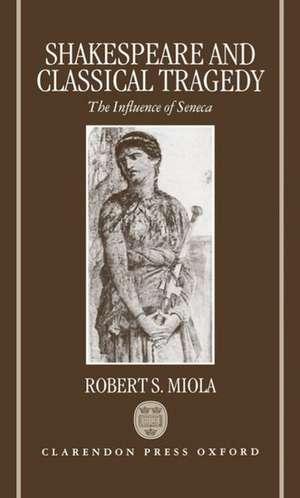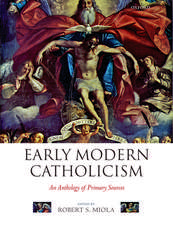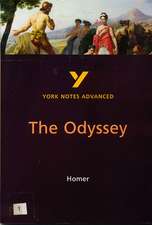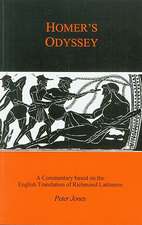Shakespeare and Classical Tragedy: The Influence of Seneca
Autor Robert S. Miolaen Limba Engleză Hardback – 18 iun 1992
Preț: 1006.14 lei
Preț vechi: 1531.29 lei
-34% Nou
Puncte Express: 1509
Preț estimativ în valută:
192.59€ • 209.26$ • 161.88£
192.59€ • 209.26$ • 161.88£
Carte tipărită la comandă
Livrare economică 09-15 aprilie
Preluare comenzi: 021 569.72.76
Specificații
ISBN-13: 9780198112648
ISBN-10: 0198112645
Pagini: 234
Dimensiuni: 145 x 225 x 19 mm
Greutate: 0.44 kg
Ediția:New.
Editura: Clarendon Press
Colecția Clarendon Press
Locul publicării:Oxford, United Kingdom
ISBN-10: 0198112645
Pagini: 234
Dimensiuni: 145 x 225 x 19 mm
Greutate: 0.44 kg
Ediția:New.
Editura: Clarendon Press
Colecția Clarendon Press
Locul publicării:Oxford, United Kingdom
Recenzii
`a detailed, learned and rewarding examination of a number of Senecan motifs ... Professor Miola has written a book of lasting importance.'A Journal of English Language and Literature, Vol 74, No 6 (Dec 1993)
`tightly organized, richly documented, and carefully articulated ... a sensitive analysis of a culture's and a writer's use of Senecan characters, conventions, and rhetoric ... Miola's analysis is consistently subtle and persuasive. Shakespeare and Classical tragedy is a sophisticated study that well deserves our attention.'Sixteenth Century Journal XXXIV/4 (1993)
`Miola's method reveals itself to be impressively eclectic and adventurous ... an impressive, scholarly book that is not only well written and lucid but extremely illuminating.'Martin Coyle, University of Wales, Cardiff, Notes and Queries, September 1993
'Adept in discerning possible classical influences, Miola's book refines our vision of the playwright at work, adding another lens through whch to view his accomplishment without drastically changing the old prescription.'Paula S., Berggren, Baruch College of CUNY, Classical and Modern Literature, Fall 1993. Vol. 14, No.1
'In his book he presents a good deal of new evidence and no doubt offers many new insights, There is no doubt that Miola's new book has its qualities and merits for which we have to be grateful.'Wolfgang Riehle. Archiv
'... it is the accumulation of evidence and the demonstration of how profoundly the raw material is often transformed that is imprssive. Miola's work not only suggests a great deal about The Influence of Seneca, the book's subtitle, but it consistently takes the reader beyond source study, as any good book about sources always does.'C.B. Hardman. University of Reading. MLR Vol 89
this is a useful and lively survey...Students will thank Miola for discussing plays which others are content to mention as self-evident examples of Senecan influence, and they will find him thought-provoking.
Unlike some books being published today, Miola's study produces exactly what its title promises ... the strength of the book lies in a series of close readings in which attention to New Comedy and its Renaissance contexts leads to some sharp observations about several of Shakespeare's plays ... this book is more than enough to establish Miola as an authority, if not the authority, on Shakespeare and Roman drama.
A companion piece to his fine Shakespeare and Classical Tragedy: The Influence of Seneca, this volume provides us with a wolid examination of the "influence of Plautus and Terence" that Shakespeare inherited as a part of the air he breathed ... a work of great value.
`tightly organized, richly documented, and carefully articulated ... a sensitive analysis of a culture's and a writer's use of Senecan characters, conventions, and rhetoric ... Miola's analysis is consistently subtle and persuasive. Shakespeare and Classical tragedy is a sophisticated study that well deserves our attention.'Sixteenth Century Journal XXXIV/4 (1993)
`Miola's method reveals itself to be impressively eclectic and adventurous ... an impressive, scholarly book that is not only well written and lucid but extremely illuminating.'Martin Coyle, University of Wales, Cardiff, Notes and Queries, September 1993
'Adept in discerning possible classical influences, Miola's book refines our vision of the playwright at work, adding another lens through whch to view his accomplishment without drastically changing the old prescription.'Paula S., Berggren, Baruch College of CUNY, Classical and Modern Literature, Fall 1993. Vol. 14, No.1
'In his book he presents a good deal of new evidence and no doubt offers many new insights, There is no doubt that Miola's new book has its qualities and merits for which we have to be grateful.'Wolfgang Riehle. Archiv
'... it is the accumulation of evidence and the demonstration of how profoundly the raw material is often transformed that is imprssive. Miola's work not only suggests a great deal about The Influence of Seneca, the book's subtitle, but it consistently takes the reader beyond source study, as any good book about sources always does.'C.B. Hardman. University of Reading. MLR Vol 89
this is a useful and lively survey...Students will thank Miola for discussing plays which others are content to mention as self-evident examples of Senecan influence, and they will find him thought-provoking.
Unlike some books being published today, Miola's study produces exactly what its title promises ... the strength of the book lies in a series of close readings in which attention to New Comedy and its Renaissance contexts leads to some sharp observations about several of Shakespeare's plays ... this book is more than enough to establish Miola as an authority, if not the authority, on Shakespeare and Roman drama.
A companion piece to his fine Shakespeare and Classical Tragedy: The Influence of Seneca, this volume provides us with a wolid examination of the "influence of Plautus and Terence" that Shakespeare inherited as a part of the air he breathed ... a work of great value.















